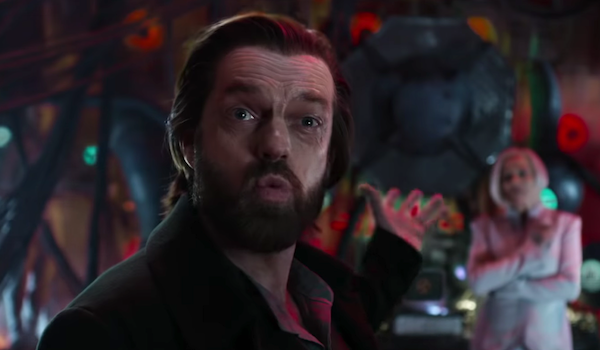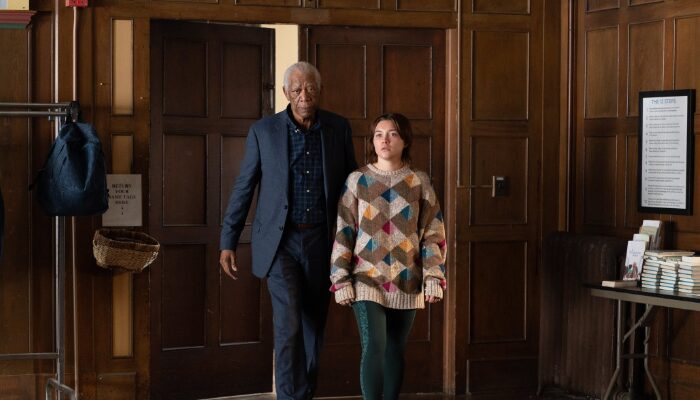Why Audiences & Fans of MORTAL ENGINES Decided to Skip the Film In-theater
Table of Contents
Why Audiences & Fans of Mortal Engines Decided to Skip the Film In-theater
The calamitous performance of Mortal Engines at the box office over the last three weekends is something most people could not have predicted. There was no buzz surrounding Mortal Engines before it hit theaters, a possible harbinger of this disaster, but that was not indicative of what befell the film. Niche science-fiction / fantasy books automatically have a smaller following and awareness-factor than more mainstream, lauded books e.g. Dune, A Song of Ice and Fire, The Hunger Games, and The Lord of the Rings.
Because of Mortal Engines’ catastrophic box office take, and the loss of production money that will result from it (not to mention the loss of marketing costs), fans of the Mortal Engines‘ book series will never see on the big screen the further adventures of the surviving characters from this film.
I saw Mortal Engines in-theater and read three of the four books in the Mortal Engines book series. I watched the film in three ways: 1.) as a fan and reader of the source material, 2.) as a film critic, and 3.) as a science-fiction film lover.
Here are the factors that I believe led to Mortal Engines failure at the box office.
Mortal Engines Film Failure Factors
1.) Mortal Engines was Released Post-game Changers. The film adaptation of Mortal Engines came out too late. Mortal Engines was released in theaters after: The Hunger Games film franchise, The Lord of the Rings trilogy, The Hobbit trilogy, The Harry Potter film franchise, The Divergent Series, The Maze Runner trilogy, and The Twilight Saga.
The cinematic bar was significantly high when Mortal Engines‘ traction treads touched down. The high standard set by the aforementioned book-to-film adaptations never allowed Mortal Engines to gain a grip on the box office, let alone the minds and imaginations of national and international movie theater audiences.
Why walk into a movie theater and watch Hester Shaw stab Thaddeus Valentine when you watch Strider engaged in a gritty sword fight with Uruk-hai leader Lurtz from the comfort of your home?
The emotional, action, narrative, and fascination-draw to most of the aforementioned films is high.
What’s the film audience draw with Mortal Engines? What seizes film audiences about its narrative? Mobile cities?
What is the hit-making, defining element that separates Mortal Engines from the aforementioned films? When I watched Mortal Engines, I couldn’t see or feel one.
2.) Little-to-no world building in the film. The mystique of the Engineer, Navigator, and Historian guilds is completely missing from the film adaptation of Mortal Engines. This fact critically wounded the world-building that the Mortal Engines screenplay is trying to establish to the point where no world building takes place. Mad Max: Fury Road is notable example of good world-building with its War Boys, their religion, the way they look (different from those around them), and act. The Mad Max: Fury Road script built this micro-world and others while simultaneously telling a story. Mortal Engines, on the other hand, tells the main story without the smaller elements, like the Engineer’s appearance e.g. bald heads, so that there is nothing unique about Engineers, their guild, or their non-existent section of the film where they are among their own. If you multiply this be all the other guilds shown on-screen in Mortal Engines, stripped of their individual and outer-ward identity, all you have left on-screen are ordinary people in the future in semi-recognizable outfits.
3.) Lack of mobile cities in a film about mobile cities. This is odd in the film. It reduced mobile cities into more of a marketing gimmick than a substantive aspect of the narrative in the film. In The Hunger Games, half the film deals with the arena. The viewer feels the arena and its different aspects. The viewer sees the dangers inherent to that particular environment. In Mortal Engines, the viewer doesn’t get the feel of mobile cities, even when they are taken to Salthook and London. Both environments could be stationary and almost nothing in the film would be changed (besides the highly entertaining beginning sequence of the film).
4.) Hester Shaw is an uninteresting main character. The film incarnation of Hester Shaw is bland and vanilla. The viewer feels nothing for her throughout the entire film. She elicits no sense of empathy. Nothing about her sets her apart for other forgettable book-to-film heroines in regards to her story-line, goal, or appearance. On the latter point, her appearance is drastically changed from the book to make her pretty and marketable. In the book (spoiler), Hester Shaw’s face has been horribly mutilated by a sword: she is missing one eye, part of her nose is damaged, and her mouth is in a permanent sneer. She is regarded as “hideous” and “ugly” by all those that see her à la Sandor “The Hound” Clegane from George R.R. Martin‘s A Song of Ice and Fire.
For marketing purposes, the producers of Mortal Engines decided to make Hester Shaw comely and thus robbed their heroine of her most unique and startling feature.
Personal aside – I decided to read Mortal Engines because when the first movie trailer for the film came out, websites were talking about how drastically Hester Shaw’s appearance had been changed. When I read about her true appearance, I became intrigued. I wanted read it about her myself and find out what had caused all of that facial damage.
That mystery drove me to read Mortal Engines. Perhaps that very same mystery might have driven more people to see Mortal Engines in-theater.
5.) Thaddeus Valentine is Stereotypical Antagonist. In the film, Thaddeus Valentine is no longer Magnus Crome’s self-deluded pet, perhaps due to the casting of Hugo Weaving in the Valentine role. Thaddeus Valentine is aggrandized from book-to-film in a typical, megalomaniac bad guy way i.e. seeking a goal that ultimate destroys him and the people that follow him. Unlike Herman Melville‘s Moby Dick, Valentine is no Captain Ahab. The complexity of that character is not present in Valentine. What the viewer gets with the film incarnation of Valentine is what they have seen numerous times before, in numerous films, most notably in the James Bond film franchise.
6.) Shrike is an Empty Villain (like Kaecilius in Dr. Strange). The film incarnation of Shrike has no razor-sharp hand claws, he isn’t a vicious killer, and his war veteran status has been erased. In effect, Shrike is de-fanged in Mortal Engines. What remains in the film is a walking, talking automaton with no past. This results in the mystique of the Stalkers not being built up in Mortal Engines. In The Fellowship of The Ring, the reputation and stature of Lurtz and the Uruk-hai are built up in the minds of the other characters and the viewer throughout the film. In Mortal Engines, none of that ground work is put in place for Shrike and Stalkers in general.
7.) Mortal Engines Has a Weak Second and Third Act. The alterations made to the penultimate and final acts of Mortal Engines‘ narrative, when translated from book-to-film, were completely detrimental. If a change is to be made in such a translation, it should be for the betterment of the story and the movie-going experience. The changes made to Mortal Engines‘ story-line didn’t improve the narrative, they degraded it.
Case and point: a happy ending is plastered onto the film instead of the harsh, unforgiving ending from the book.
Other deleterious changes from book-to-film: a.) No engulfing fire on the top deck of London in the third act of the narrative, b.) no museum battle (a sacrifice air battle is put in its place), c.) Katherine Valentine’s dying body does not cause the end MEDUSA and life on London, d.) London is not destroyed. Instead, the interlopers (Anna Fang and company) shut down MEDUSA and Thaddeus Valentine just waltzes out of St. Paul’s Cathedral as his super-weapon fizzles in the background.
It is the definition of anti-climatic.
These are sizeable mistakes in Mortal Engines‘ screenplay. By making these changes from book-to-film, the film’s finale is made into a collection of ordinary, generic, and forgettable scenes that the viewer watches with no engagement. Imagine, for a moment, if the book’s ending for Mortal Engines was in place in the film. Remember how bad the film ending to V for Vendetta was? Imagine if that film’s producers had used the ending from the V for Vendetta graphic novel in that book’s film adaptation (reflecting on how much better the graphic novel’s unique ending is to the severely altered ending in the film). That is what is on-screen in Mortal Engines – the lesser, non-controversial, standard happy ending that everyone has seen before and no one will be thinking afterward because it is trite.
Non-failure Factors that Did the Film No Favors
Admittedly, these are nitpicks but they bothered me so much that I had to write about them. If I had written a review for Mortal Engines, most if not all of the below would have been mentioned or alluded to in that review.
1.) Ineffective Father Reveal. The father reveal during the final fight in Mortal Engines falls flat and is as anti-climatic as what happens to the machine dubbed MEDUSA. Neither of the characters involved in the reveal have been built up in any creditable way throughout the film. So when something happens to one of these characters or something is revealed about them, its meaningless because the viewer doesn’t care about the characters. It’s like pouring water into an empty cup. You are pouring something unsubstantial into an empty vessel. You start with nothing and after the pouring you are left with nothing. All that has been altered is the volume of that nothing.
When Darth Vader reveals that he is Luke Skywalker’s father in Star Wars: The Empire Strikes Back, it means something to all the characters involved, their relationship to each, to others, it places a new light of everything that happened up to that point, and it alters the actions of both characters moving forward. In Mortal Engines, none of that thought-process is present in the film. The reveal feels tacked on and it doesn’t alter the actions of either character. If the reveal has no effect on the narrative, the characters’ reactions, or motivations, what is the point of the reveal?
2.) Scientists that are incurious about science and technology.
In the film, Dr. Twix, a scientist, finds out that there is an active and operational Stalker still in existence, within arms reach, and she doesn’t do everything within her power to acquire it. Twix has absolutely no scientific curiosity about a priceless piece of old technology that is available for her and other London Engineers to study, dissect, and possibly reproduce.
Dr. Twix’s attitude toward the Stalker makes no sense from the perspective of: a scientist, an intellectual, or a war weapon creator. Even if Dr. Twix is consumed with making MEDUSA work, that doesn’t explain her lack of interest in another viable military weapon, one that may or may not be able to be exploited to the technological enrichment of London. If Twix has no time to study and examine the Stalker because of MEDUSA, why doesn’t she send another Engineer to investigate and evaluate the Stalker?
3.) Anna Fang’s wanted posters and the absence of disguise. Anna Fang doesn’t bother to alter her physical appearance one iota in Mortal Engines, even-though there are wanted posters all over London (and presumably other cities) with her exact, current appearance, including the sun glasses she wears all the time (Fang is instantly recognized at the slave market). This is far too stupid of a plot point to be ignored. This may be the most idiotic plot element in the entire film. There is shutting off your brain and enjoying a popcorn film and then there is this. For Quirke-sake, do a little work on your film’s characters, make them realistic, or heavens forbid, make them intelligent to hide their true identity when there is a price on their head.
4.) Too many longing looks between Hester Shaw and Tom Natsworthy. The growing affection between Hester Shaw and Tom Natsworthy is handled in a heavy-handed way in Mortal Engines. The love elements aren’t organic, like in Lost in Translation, but seem forced, especially after a harrowing moment has come and gone. Instead of the plethora of longing looks, why not build an attraction between the two characters based on something other than physical attraction?
Closing Thoughts
Mortal Engines is $150 million (budget and marketing cost) cautionary tale to future adapters of books-to-films. Mortal Engines isn’t a bad film, it’s an ordinary one. Mortal Engines doesn’t have that special spark that the first The Hunger Games film has. The Hunger Games adaptation didn’t have “everything” from the novel in the film. Avoiding that trap is one of the elements that made The Hunger Games successful. What that book-to-film adaptation did have was a good screenplay and a sympathetic protagonist, someone that the audience understood and could see themselves in. Mortal Engines has severely diluted incarnations of both of these key components.
Unlike Dune‘s film adaptation, which had to boil down its complex plot-line to the surface conflicts of its narrative, with nods to what had been cut out, with Mortal Engines, what you see is what you get. No allusions are present in Mortal Engines‘ screenplay, no subtleties. Mortal Engines is what I feared it might be turned into when translated to cinema – an empty action film with high-end CGI, a refugee from the late 80’s and early 90’s. All that is missing from the film is a charismatic muscle man or a one-eyed girl with a horrific facial scar and so much hatred in her heart that her personality has been twisted by it.
Leave your thoughts on Why Audiences & Fans of Mortal Engines Decided to Skip the Film In-theater below in the comments section. Readers seeking more Mortal Engines can visit our Mortal Engines Page and our Mortal Engines Facebook Page. Readers seeking more editorials can visit our Editorials Page. Want up-to-the-minute notification? Want up-to-the-minute notifications? FilmBook staff members publish articles by Email, Twitter, Tumblr, Google+, and Facebook.
Related Articles
FilmBook's Newsletter
Subscribe to FilmBook’s Daily Newsletter for the latest news!













